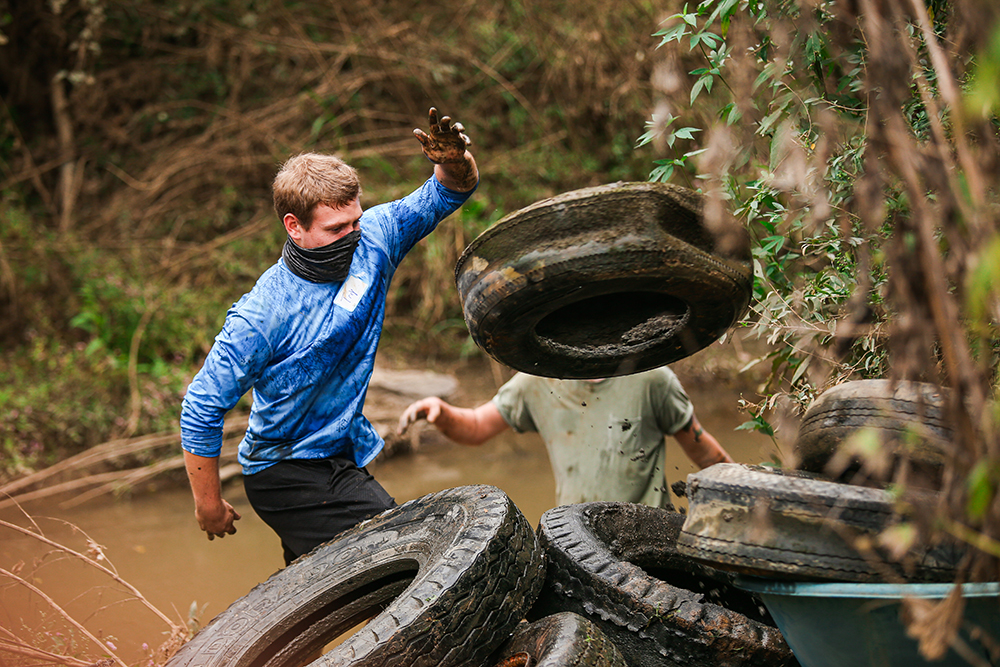
Applying classroom experiences in the field showed Arkansas Tech University student Aaron Norton that solutions are attainable for those willing to invest their energy and expertise.
“Many times, problems in the outdoors can seem too large for something to be accomplished,” said Norton, “but experiences like the stream clean-up reaffirm a certain faith that, with hard work, we can all make a difference toward bettering our world.”
Norton was part of a group of ATU students and faculty from the fisheries and wildlife science program who participated in a clean-up of Prairie Creek in Russellville on Friday, Oct. 9.
The outreach was part of a national initiative developed by the American Fisheries Society once its annual meeting was canceled due to the coronavirus (COVID-19) pandemic. The group had planned to clean a river in Columbus, Ohio, during its conference, but when that became impossible the society challenged its members to conduct similar clean-up projects in their communities.
Dr. Susan Colvin, assistant professor of fisheries science at ATU, and Dr. Jorista Garrie, assistant professor of wildlife science at ATU, answered the call. They collaborated with the ATU Fisheries and Wildlife Society student organization and the program’s orientation-level students to organize the effort.
Colvin explained the goal was to provide students with “tactile, experiential learning they are missing right now with much of their learning taking place virtually.”
Brittany Edwards, a senior in the fisheries and wildlife science program at ATU and president of the Arkansas Tech Fisheries and Wildlife Society, indicated that goal was met.
“I enjoy any opportunity to be outside and apply my classroom knowledge to identify the nature around me,” said Edwards. “When my peers and I can converse on the species of a plant or organism in front of us, I know that my classroom knowledge will be useful after graduation. By participating in clean-up projects like at Prairie Creek, we can prevent that ecosystem from becoming polluted and potentially harming organisms such as fish and plants.”
First-year ATU graduate student Carice Godbey found the project equally beneficial to the humans involved in the process.
“These are times for graduate students like me to break free of the office and the writing and really get to know the other students and professors at the university, which can be important for our mental health and the development of our professional community,” said Godbey. “It is also an opportunity to explain to passing citizens the importance of taking care of our environmental systems. And, let me tell you, the appreciation we get from the public and the invigoration that these events can spur in students are all the motivation I need to keep myself rooted in my career. I absolutely love it.”
According to the ATU fisheries and wildlife science web page, the program seeks to “prepare a diverse group of students to pursue careers as field or research biologists and provide the sound ecological foundation so they are able to make wise decisions and take prudent actions regarding the management, productivity and sustainability of our fish and wildlife resources.”
As a senior in the program, Dakota Smith has felt the positive effects of that mission.
“One of the biggest strengths of the ATU fish and wildlife program is we have wonderful and caring professors who are willing to do anything for students to help us succeed in all our future endeavors as well as while we are here getting our degrees,” said Smith. “One of those ways is helping us gain valuable connections with future employers through volunteer opportunities, internships and bringing in guest speakers from state and national agencies.”
Godbey, who earned her bachelor’s degree at Mississippi State University, said the ATU fisheries and wildlife program compares favorably to similar programs around the nation.
“I think our strengths are exemplified in a certain holistic approach to learning,” said Godbey. “We are not just learning from our classes and we aren’t just obtaining a quality education. We are also fulfilling requirements for professional certifications and building our professional circles and manifesting resumes. The ATU fisheries and wildlife program stands on its own as a quality program in the biology field even among the bigger universities, just on a smaller scale. This means we are able to learn both inside and outside the classroom with experiences that are directly applicable to our profession. It is a real stepping stone in working toward a fisheries and wildlife career.”
Learn more about the ATU fisheries and wildlife science program at www.atu.edu/biosciences/fishwildlife/index.php.






